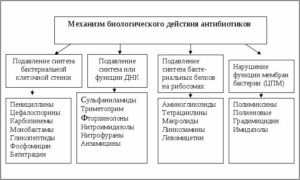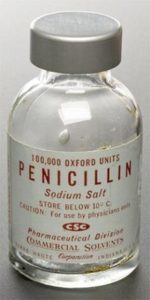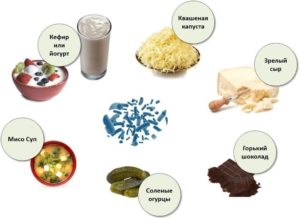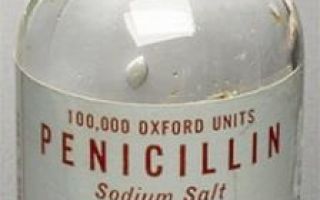Content
- 1 What are antibiotics and their properties
- 2 Why antibiotics are harmful to the body
- 3 Why antibiotics are dangerous for children
- 4 Can I drink antibiotics during pregnancy?
- 5 Antibiotics for breastfeeding
- 6 Side effects of taking antibiotics
- 7 Are there any benefits of antibiotics
- 8 Antibiotics and alcohol
- 9 How long does it take for antibiotics to be removed from the body?
- 10 How to restore the body after taking antibiotics
- 11 Conclusion
The benefits and harms of antibiotics depend on the specific disease and the individual characteristics of the organism. First of all, you should know what kind of compounds they are, what is their classification.
Antibiotics are a group of drugs whose action is aimed at suppressing bacteria, microbes, fungi and other microorganisms in the body that provoke infectious diseases.
What are antibiotics and their properties
The main property of the compounds of this series, which distinguishes them from other drugs, is their selective effect. They are aimed at blocking specific microorganisms or their groups, while not having a negative effect on other types of bacteria, etc.
Features of the action of antibacterial drugs:
- A gradual decrease in the therapeutic effect due to the fact that the cells of one or another microorganism get used to their effects over time.
- The activity of drugs does not take place in the tissues of the body, but in the cells of pathogenic bacteria.
Antibiotics are classified according to the method of production:
- Natural.
- Artificially synthesized.
- Obtained by chemical modification of natural substances.
The presented classification is conditional, since many "natural" medicines are obtained exclusively by chemical synthesis.
Why antibiotics are harmful to the body
The harm from the use of such dosage forms is due to the fact that they have an effect on the internal organs and systems. The negative effect is also due to the decay products of pathogenic bacteria, which have a toxic effect on organs and tissues of the body.
Liver after taking antibiotics
The liver is most susceptible to harmful effects, since the decay products of one or another antibacterial drug pass through it. The following phenomena can be observed:
- The appearance of inflammatory processes both in the liver itself and in the gallbladder.
- A negative effect on the metabolic process, which can lead to serious consequences.
- Pain syndrome - occurs when the course of treatment with drugs of this group is delayed.
- Gallbladder dysfunction.
Other effects may occur depending on the properties of the particular drug.
Stomach and pancreas after taking antibiotics
Antibiotics affect the stomach and pancreas. The main harm is an increase in the level of acidity of gastric juice. Such manifestations as diarrhea, nausea and vomiting often occur when the dosage of drugs is exceeded.
How antibiotics affect the heart
Medicines can be harmful to the cardiovascular system.This usually manifests itself as:
- Blood pressure surges, both in the form of an increase and a decrease.
- Arrhythmias, pulse disorders.
Some drugs can increase the risk associated with dangerous situations, including cardiac arrest. This is true for people with cardiovascular disease.
Effects of antibiotics on the kidneys
The kidneys are the second organ most susceptible to the harmful effects of drugs of this type. Negative manifestations are expressed in:
- Kidney dysfunction.
- Changes in urine indicators, its smell and color.
Antibiotics are harmful to the kidneys due to the fact that they can have a devastating effect on the epithelium that covers the outside of the organ.
The effect of antibiotics on the nervous system
Certain medications can cause nervous system side reactions. These include:
- Lethargy and significant delay in reaction.
- Dysfunction of the vestibular apparatus, impaired coordination and dizziness.
- Deterioration of short-term memory and concentration.
Therefore, doctors recommend refraining from activities associated with these risks, including driving vehicles, during the course of treatment with some antibacterial drugs.
Effect on blood and urine tests
Medicines of this group affect the main indicators of blood and urine, which must be taken into account when taking tests.
Major stat changes:
- Decreased production of red blood cells.
- Decrease in the content of leukocytes.
- Certain medications increase the amount of histamines.
- Decreased platelet count.
- Decrease in calcium and potassium content.
- Decreased hemoglobin.
- Decreased platelet count.
- Effect on blood clotting.
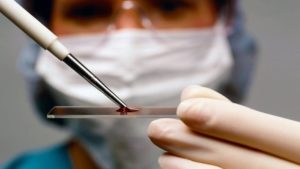
The effect on the indicators of urine tests can be as follows:
- Change in color and odor.
- Change in acidity levels.
The vast majority of such drugs have a greater effect on blood counts than urine.
The effect of antibiotics on potency
Most of the antibiotics used in modern medicine do not harm the health of men and their reproductive functions. During the course of treatment, some dysfunction may be observed, but it is associated not so much with the properties of the drugs as with the general condition of the body, which spends its internal resources to fight infection. Sexual function is fully restored after the completion of the course of treatment.
Why antibiotics are dangerous for children
These products are more harmful to children than to adults. Possible damage to the kidneys and liver, the occurrence of allergic reactions, pathological processes in the stomach and intestines. This effect of the drug on the child's body is manifested in more severe forms, therefore, many drugs are contraindicated for use by children under 8 years of age. In addition, certain medications can have a negative effect on tissue formation during the growth and development of the child's body.
Can I drink antibiotics during pregnancy?
Many antibacterial drugs cannot be used during pregnancy, with the exception of: penicillin, cephalosporin, macroids. They are the safest for pregnant women.Other drugs can provoke pathologies of the gastrointestinal tract, negatively affect the bacterial flora of the reproductive organs and harm the fetus. Therefore, the appointment of antibiotics during this period is made taking into account the balance of harm and benefit both for the expectant mother and for the child.
The use of antibiotics should be minimized in the first trimester of pregnancy, since during this period all the basic systems of the baby's vital activity are formed.
Antibiotics for breastfeeding
Certain antibiotics are acceptable for breastfeeding women. If necessary, breastfeeding after taking antibiotics is not recommended. The decision on drug therapy with these means should be made by the attending physician based on how harmful specific antibiotics are for the baby and the woman needs.
Side effects of taking antibiotics
In general, taking these medications can provoke the following side effects:
- Damage to liver and kidney tissue.
- Damage to the nervous system, characterized by the appearance of dizziness and headaches, vestibular dysfunction.
- Negative effect on the microflora of the stomach and intestines.
- Damage to the oral mucosa and reproductive organs.
- Allergic reactions.
- Local reactions - dermatosis at the injection site and other pathologies of the skin.
- Increased body temperature.
- Menstrual changes. Menstruation after antibiotics may be delayed or, on the contrary, appear earlier. Pain syndrome may occur.
- Antibiotics can be harmful to blood cells and cause anemia.
Are there any benefits of antibiotics
Despite the fact that taking antibiotics negatively affects the activity of certain organs and systems of the body, this class of drugs in most cases is beneficial. It destroys harmful bacteria and prevents them from growing. The indispensability of antibacterial drugs is due to the fact that other medications may not provide the necessary therapeutic effect in the treatment of bacterial infections. Therefore, the benefits and harms of antibiotics for the human body are determined in each case individually.
Indications for use
Diseases for which antibiotics are beneficial include:
- Pathology of the nasopharynx of bacterial genesis.
- Infectious skin diseases.
- Bronchitis, pneumonia and other respiratory diseases.
- Bacterial infections of the genitourinary system.
- Intestinal and gastric pathologies provoked by pathogenic bacteria.
- Prevention of infections in trauma, for the treatment of purulent wounds.
The properties of antibiotics are such that their use is advisable for the treatment of pathologies provoked by pathogenic microflora.
How to drink antibiotics without harm to health
Antibacterial drugs are potent in their properties, therefore, in order for the treatment to take place with maximum benefit for the patient, it is necessary to adhere to some recommendations:
- The basic rule is not to self-medicate, not to adjust the timing and dosage of drugs at your own discretion. Correctly selected dosage is a guarantee that medicines will not cause side reactions and cause minimal harm to organs and tissues.
- Any potent medicine has a list of contraindications. The attending physician should take into account all the diseases in the anamnesis, and the patient should carefully read the instructions for the medicinal product prescribed by the doctor.Phenomena such as individual intolerance to a particular substance or allergic reactions can only be detected during the course of taking the medication. In this case, you should promptly consult a doctor who will replace the antibiotic with an acceptable option.
- Most of these medications should be taken after meals to reduce the negative effects on stomach acidity and intestinal microflora. For this reason, the tablets should be taken with plenty of water.
- Antibacterial agents cannot be combined with the simultaneous intake of alcoholic beverages: at least this can reduce the effectiveness of treatment, in the worst case, have a serious negative effect on the body.
- Potential harm from drugs is often stopped by probiotics, that is, substances with the opposite effect, which are taken only on the recommendation of a specialist.
- It is allowed to take vitamin and mineral complexes that smooth out the harmful effects of antibiotics.
Consequences of uncontrolled antibiotic use
Massive and uncontrolled self-medication is a serious problem in medical practice. The use of medicines without the appointment and supervision of a doctor is harmful and dangerous:
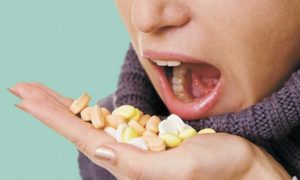
- Lack of effect and benefit. This class of medicines is aimed at treating diseases of bacterial and infectious genesis. If other factors are the cause of the disease, the effectiveness of drug treatment is absent, but side reactions from their effects on the body persist.
- Decreased immunity and addiction. Harmful bacteria tend to adapt to the action of antibiotics, so in the long run, the medication may not be beneficial. In addition, it can negatively affect healthy bacterial flora, which can lead to a decrease in immunity.
- It has been proven that overuse of antibiotics can increase the risk of cancer.
- The percentage of allergic reactions is high.
That is why medicines will only be beneficial if recommended by the attending physician.
Antibiotics and alcohol
In most cases, the simultaneous use of antibacterial agents and alcohol is contraindicated. Medicines in this group themselves put a lot of stress on the liver and kidneys. Drinking alcohol can significantly increase the intoxication of these organs.
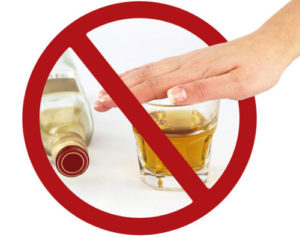
The effect of alcohol and antibiotics on the body is ambiguous. The pharmacokinetic characteristics of most medicines (and hence the benefits of their use) decrease, and the negative effect on the liver increases. Therefore, it is worth focusing on medical recommendations and rules for the use of a specific antibacterial agent.
How long does it take for antibiotics to be removed from the body?
The timing of the elimination of antibiotics from the body is individual in each case. This is influenced by factors such as:
- Properties of the medicine.
- Individual properties of the organism, including the metabolic rate.
- Diet.
- Characteristics of the disease.
The peak concentration of most substances in the blood occurs after eight hours. The average withdrawal time is from one day to a week after the end of the course.
How to restore the body after taking antibiotics
After the end of the course of treatment, the body should be helped to neutralize the negative effect of taking medications. This can be done using the following methods:
- Taking vitamin complexes.
- Taking probiotics, the properties of which will help restore microflora.
- Adjustment of the daily diet, the use of foods with a high content of biologically active substances. Fermented milk products are especially useful.
- When antibacterial drugs have an undue effect on the liver, hepatoprotectors are prescribed to restore its functions.
Recovery will take place quickly if medical recommendations are strictly followed.A well-calculated dosage of the drug and the treatment regimen are the key to a quick restoration of the functions of internal organs.
Conclusion
The benefits and harms of antibiotics are determined in each case individually. In most cases, the benefits of their use are quite tangible. They are indispensable for the treatment of diseases of bacterial genesis. The main thing is to strictly adhere to the recommendations of the attending physician.

